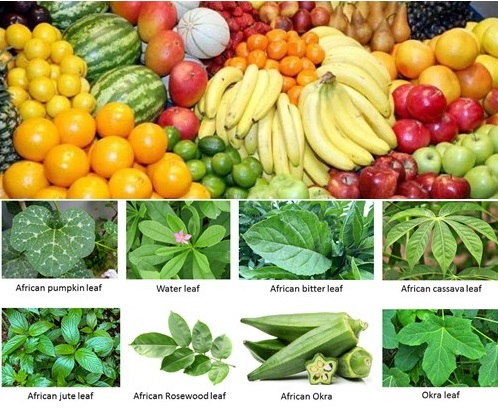By Adebowale Bello. BTech (Microbiology). Freelance Health Writer. Medically reviewed by The DLHA Team.

A sampling of varieties of fruits and vegetables available in Africa.
The typical African diet contains a rich combination of fruits and vegetables which add flavour and colour to every meal. Apart from being delicious, they're also powerful allies in the fight against chronic diseases such as hypertension and heart issues.
Hypertension is a silent epidemic affecting millions worldwide and it's a major risk factor for heart disease, stroke and kidney problems. While medications play a crucial role in managing hypertension, there has been less attention on the dietary approach to the control hypertension.
This dietary plan should be the first-line treatment for primary hypertension due to the role that fruits and leafy vegetables play in the body and a new study supports this view with evidence.
Our bodies are constantly working to maintain a delicate balance between acids and bases (caustics). This equilibrium is crucial for numerous bodily functions including enzyme activity, oxygen transport and overall cellular health. The foods we eat play a significant role in this balancing act.
Many animal-based foods such as meat and dairy products tend to produce acids when digested by the body. On the other hand, most fruits and vegetables have an alkalizing or caustic effect, meaning they help neutralise acids.
A new study followed 153 participants over a 5-year period. These individuals all had high blood pressure and showed early signs of kidney disease which made them ideal for the study.
They were divided into three groups and closely monitored over the course of the study.
1. Fruits and Vegetables Group: Everyday, this group received 2 to 4 servings of (neutralizing) base-producing fruits and vegetables such as apples, oranges, potatoes, spinach and carrots.
2. Sodium Bicarbonate Group: Participants in this group took oral sodium bicarbonate tablets, which mimic the alkalising (neutralising) effect of fruits and vegetables.
3. Control Group: These participants received standard care for hypertension and kidney disease without any specific dietary interventions.
Compared to the control group, the fruit & vegetables and bicarbonate group showed a slower decline in kidney function suggesting that eating more alkaline food has a protective effect on the kidney.
The fruit & vegetables group also had a lower systolic blood pressure compared to both the control and sodium bicarbonate groups. This indicates that increasing fruit and vegetable intake may be even more effective than oral bicarbonate supplements for blood pressure control.
Also certain types of cholesterol, often referred to as “bad” cholesterol that are associated with increased heart disease risk declined in the fruit & vegetables group.
These findings add to the growing body of evidence suggesting that a diet rich in fruits and vegetables can be a powerful tool for managing high blood pressure, protecting kidney health and reducing the risk of cardiovascular disease.
Here are some practical steps you can take,
Fruits and vegetables provide vitamins and minerals and have wider health benefits. If you live with high blood pressure, you can take control of your health by consuming more fruits and leafy vegetables as part of control processes that are recommended by your healthcare provider.
Whether you're shopping at a local market, tending a small garden or simply thinking about your next meal, you have the power to positively impact your health.
Source:
Goraya, N, Madias, N.E, Simoni, J, Kahlon, M, Aksan, N & Wesson, D. E. (2024). Kidney and cardiovascular protection using dietary acid reduction in primary hypertension: A five-year, interventional, randomized, controlled trial. The American Journal of Medicine, 137(8), 832-840. Available from here
Related:
Hypertension in Nigerian Adults: Essential things to know
Best African Foods To Lower Your Blood Pressure
Top 10 Heart Healthy African Foods
Published: August 14, 2024
© 2024. Datelinehealth Africa Inc. All rights reserved.
Permission is given to copy, use and share content for non-commercial purposes without alteration or modification and subject to attribution as to source.
DATELINEHEALTH AFRICA INC., is a digital publisher for informational and educational purposes and does not offer personal medical care and advice. If you have a medical problem needing routine or emergency attention, call your doctor or local emergency services immediately, or visit the nearest emergency room or the nearest hospital. You should consult your professional healthcare provider before starting any nutrition, diet, exercise, fitness, medical or wellness program mentioned or referenced in the DatelinehealthAfrica website. Click here for more disclaimer notice.